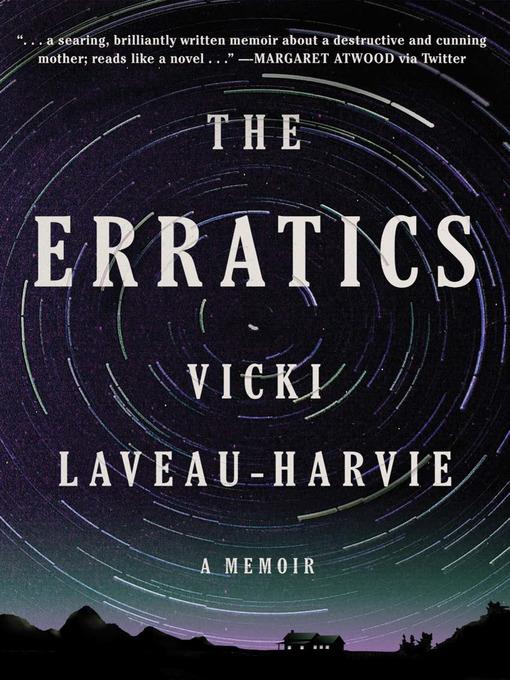
The Erratics
A Memoir
کتاب های مرتبط
- اطلاعات
- نقد و بررسی
- دیدگاه کاربران
نقد و بررسی

May 11, 2020
Two adult sisters return to their childhood home in Canada to pick up the pieces of their shattered family in Laveau-Harvie’s eloquent debut, winner of Australia’s 2019 Stella Prize. Home is Okotoks, a prairie town in southern Alberta famous for its “erratic,” a massive rock deposited by an ancient ice sheet. Also erratic is Laveau-Harvie’s manipulative mother, a pathological liar who disowned both daughters years ago, and their once-robust father, now frail and afraid of his wife. Laveau-Harvie returns to Okotoks from Sydney, Australia, where she lives to help her younger sister assist their father after their mother is hospitalized with a broken hip. Settings echo with elegant menace—“The house is paradise in the same way the Hotel California is: a fortress with many bedrooms... a grand piano in the great room... a bomb shelter.... The doors of this house open to no one.” So do her mother, “a flesh and blood pyramid scheme, a human Ponzi,” and her sister, “rage, a geyser of it... black and viscous, coating everything.” Laveau-Harvie maintains an emotional distance throughout, keeps actual horrors (her mother would occasionally starve her father) mostly out of view, and only refers to others by their family role of mother, father, sister, or uncle. With the hinted-at disownment and childhood traumas left untold, her explanation “my past is... a blessing in disguise” leaves the reader wanting more. But that’s a minor flaw in an otherwise well-constructed, fluent memoir.

June 1, 2020
A Canadian-born educator's account of an unexpected homecoming that forced her to come to terms with a dysfunctional family past. Laveau-Harvie returned to Alberta from Australia after learning that a fall had landed her elderly, "mad as a meat-ax" mother in the hospital. The author's concern was not so much for her mother, but more for her foggy-brained father, whom her mother had starved and turned against his daughters. Long disinherited by her parents, Laveau-Harvie knew that keeping her mother confined was the only way to save her father. As she began to assess the world her estranged parents inhabited in their filthy, isolated house on 20 acres, memories of her past life with them resurfaced. Most of the memories involved her mother. Though given to sometimes-outrageous exaggeration, she could make "anything sound reasonable. On her urging, Mormons have been known to consume alcohol." She also seemed to take pleasure in making both her daughters feel like "prey," often repeating the refrain, "I'll get you and you won't even know I'm doing it." The author and her sister both fled and made lives far away from home, but when her more conciliatory sister offered to move from her home in Vancouver, her mother suggested that "trespassing anywhere near them would be answered with a Kalashnikov." For 18 months, the sisters traveled back and forth to ensure that their mother would be ruled incompetent and to see that their father received proper care. The home care specialists they hired--such as the "housekeeping slut," the "gold digger," and the "serial killer"--eventually made them realize that they would need to reforge broken ties and bring their father back into their lives. This riveting book explores family relationships--and the sometimes-devastating pain they cause--with a darkly humorous ferocity that is both remarkable and eloquent. A poignant, unsparing, often poetic memoir.
COPYRIGHT(2020) Kirkus Reviews, ALL RIGHTS RESERVED.

July 1, 2020
In this memoir, translator and editor Laveau-Harvie seamlessly interweaves past and present, speculation and reality, that is as bitter as the Canadian wilderness that she comes home to when she and her sister have to confront their manipulative mother, hospitalized after breaking a hip, and their father, a starving victim of the mother's abuse. Unflinching in its portrayal of family dynamics, yet by turns satiric, humorous, and loving, this brilliant examination of mental illness explores the effects on families and the complex ways in which people lose themselves in one another's versions of reality until they discover ways of communicating and connecting that sever some of the bonds of childhood while also renegotiating relationships. Laveau-Harvie is a gifted writer, and she tells how she and her sister both experience the complicated process of caregiving from a distance. In between, she shares recollections of her childhood, and of traveling between her native Canada and adopted home of Australia. Through it all, Laveau-Harvie writes with care and tenderness. VERDICT Similar to Maya Shanbhag Lang's What We Carry, this account is a touching portrayal of grief, family, and what is best left unspoken.--Emily Bowles, Univ. of Wisconsin, Madison
Copyright 2020 Library Journal, LLC Used with permission.

July 1, 2020
The gigantic boulders deposited by an ice sheet that snaked through what is now Alberta, Canada, are called erratics. Of course, the word also means unpredictable, which makes it an excellent title for a memoir that's essentially about the author's crazy mother. Disowned and disinherited (it's unclear exactly why and why her dad believed what her mom told him), Laveau-Harvie reconnects with her parents after her mom breaks her hip. When she travels from her own home in Australia to their remote 20-acre place in Canada, she discovers that her mother is starving her now stick-figure skin-and-bones father. Her diagnosis is that her dad suffers, like Patty Hearst before him, from Stockholm syndrome. Despite growing up with a narcissistic mother who seems like every child's worst nightmare (and ends up institutionalized), Laveau-Harvie herself seems self-centered. She lets her younger sister take on the responsibility of cleaning out their parents' house, holding an estate sale, and then for caring for her father. This well-written saga should inspire reflections on the mysteries and traumas of family dynamics.(Reprinted with permission of Booklist, copyright 2020, American Library Association.)

























دیدگاه کاربران